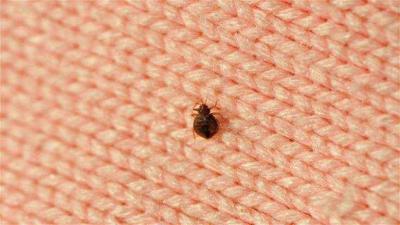It seems that France's crisis with the unwelcome guest "bedbug" continues to trouble both the government and citizens. The adult emergency section of the Laon hospital (Aisne) had to close its doors after receiving a patient suffering from bedbug bites, according to the newspaper L’Union. The man, who was transferred to care on Wednesday afternoon, was sanitized in the section's bath. However, "this building found itself infested and had to be rigorously isolated," explained Dr. Eloi Julie, head of the institution's medical committee. He added that this method wasn't enough because “service staff noticed that the parasites were crawling under the doors and heading towards other rooms,” forcing the emergency service to close its doors while a specialized pest control company inspected the building. Meanwhile, the pediatric emergency services in Laon and the nearby hospitals in Saint-Quentin, Soissons, and Château-Thierry took over.
An anti-parasitic product was distributed in the section on Wednesday, and its effectiveness lasted until mid-afternoon. The spread of "bedbugs" in public places in Paris over the past few months has caused panic in the French streets, a fear that has spread to many countries around the world, where blood-sucking insects have been spotted in the Paris metro, high-speed trains, Charles de Gaulle Airport, as well as in hospitals, various cinemas, and hotels in the French capital. Many French citizens have shared photos and videos of the insects on social media.
The bedbug is a bothersome household pest, a small parasitic insect that can pose potential health risks to all family members as it feeds on blood using a tube-like structure to penetrate the skin. They are usually more active during the night while humans are asleep or early in the morning, and bedbug bites can occur anywhere on the body but are often found on exposed areas such as the hands, face, neck, shoulders, arms, and legs.
Bedbugs are small, wingless insects that are reddish-brown in color, measuring between 4 and 7 mm. They suck human blood, causing severe itching which can escalate to skin irritation in some individuals. This highly reproductive and spreading insect feeds solely on blood and needs to have "regular blood meals" to survive and continue growing. Human blood is not their only target; they also attack various types of animals, including poultry and other birds.
The U.S. Environmental Protection Agency (EPA), the Centers for Disease Control and Prevention (CDC), and the U.S. Department of Agriculture consider bedbugs to be a "public health pest." However, unlike most other public pests, bedbugs are not known to transmit or spread diseases; they can, however, cause severe itching and skin allergies in some people, according to the EPA. They can also be a source of annoyance that often leads to psychological distress, sleep problems, anxiety, and depression.
Did they reach your home?
Bedbugs can sneak into your home unknowingly through luggage, shoes, or clothing. They can also enter your house uninvited through furniture that you bring in, especially if it is used. If you are suffering from skin itching or feel bites caused by insects, this may be a sign of a bedbug infestation in your home, especially if the bites on your skin appear as a straight line with three or four small adjacent bites. Given their small size, the agency indicates that they can spread throughout the house, particularly under sofas, between the folds of curtains, in drawers, and in corners of walls, among other places.




